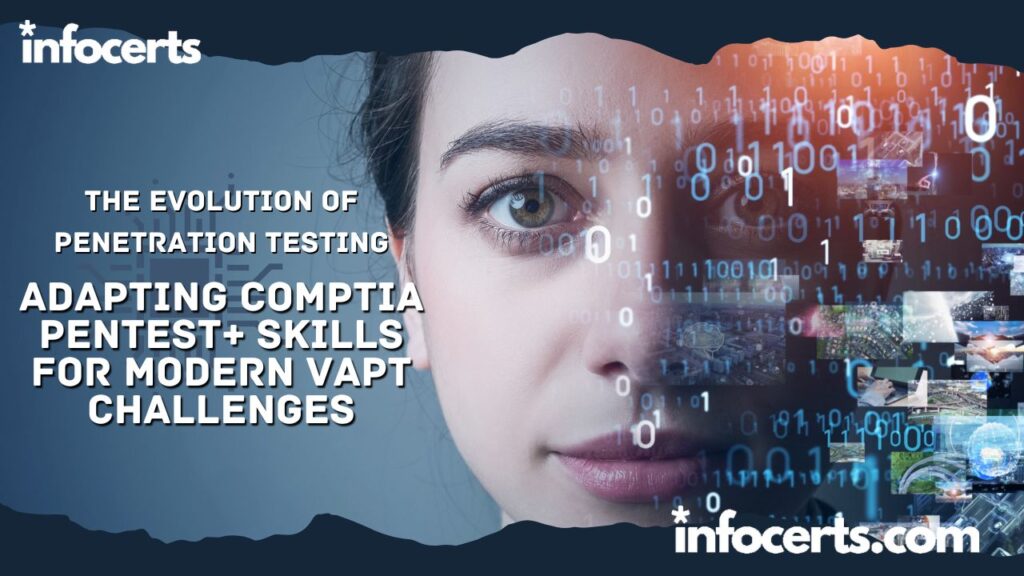In today’s rapidly evolving cyber landscape, penetration testing has become a critical component of an organization’s security strategy. The CompTIA PenTest+ certification provides IT professionals with the skills needed to effectively conduct vulnerability assessments and penetration testing (VAPT). This blog explores the evolution of penetration testing and how the skills acquired through the CompTIA PenTest+ certification can be adapted to meet modern VAPT challenges.
Evolution of Penetration Testing
Penetration testing, also known as ethical hacking, involves simulating cyber-attacks to identify vulnerabilities in systems, networks, or applications. Over time, it has evolved significantly:
Key Milestones in Penetration Testing
| Year | Milestone |
|---|---|
| 1990s | Emergence of basic manual testing methods |
| 2000s | Development of automated testing tools |
| 2010s | Integration of advanced techniques like AI and ML |
| 2020s | Emphasis on continuous testing and DevSecOps |
Modern VAPT Challenges
Today, cybersecurity professionals face complex challenges, including:
- Advanced Persistent Threats (APTs): These are prolonged and targeted cyber-attacks in which an intruder gains access to a network and remains undetected for an extended period.
- Zero-Day Vulnerabilities: These are unknown vulnerabilities in software or hardware that hackers exploit before the developer can issue a patch.
- Cloud Security: As organizations move their operations to the cloud, ensuring the security of cloud-based infrastructure becomes crucial.
- IoT Security: The proliferation of Internet of Things (IoT) devices presents new security challenges due to their often weak security protocols.
Adapting CompTIA PenTest+ Skills
The CompTIA PenTest+ certification is designed to equip professionals with the necessary skills to address these modern challenges. The certification covers various domains, including planning and scoping, information gathering and vulnerability identification, attacks and exploits, and reporting and communication.
Key Skills Acquired
- Planning and Scoping: Understanding the scope of a penetration test and developing a detailed plan.
- Information Gathering and Vulnerability Identification: Using tools and techniques to gather information about the target and identify vulnerabilities.
- Attacks and Exploits: Simulating real-world attacks to exploit vulnerabilities and understand their potential impact.
- Reporting and Communication: Documenting findings and communicating them effectively to stakeholders.
INFOCERTS, offers comprehensive training for the CompTIA PenTest+ certification. Call us at +91 70455 40400 to enroll and advance your career in cybersecurity.
Comparison with CEHv12
Both CompTIA PenTest+ and CEHv12 certifications focus on ethical hacking and penetration testing, but they differ in emphasis and content:
| Aspect | CompTIA PenTest+ | CEHv12 |
|---|---|---|
| Focus | Practical, hands-on skills | Broad knowledge of ethical hacking |
| Exam Format | Performance-based and multiple-choice questions | Multiple-choice questions |
| Key Domains | Planning, information gathering, attacks, reporting | Reconnaissance, scanning, system hacking, etc. |
Conclusion
Penetration testing continues to evolve to meet the challenges of modern cybersecurity threats. The CompTIA PenTest+ certification equips professionals with the skills needed to secure systems and mitigate risks effectively.
For more details on VAPT and to understand how the CompTIA PenTest+ aligns with CEHv12, visit our course page.
Ready to advance your cybersecurity career? Enroll in our CompTIA PenTest+ course today by contacting INFOCERTS at +91 70455 40400.

